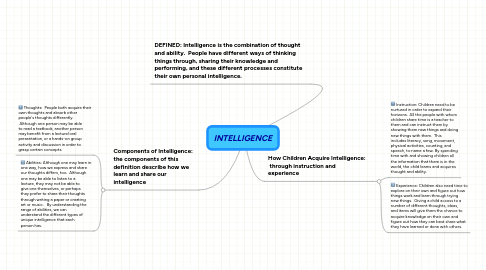INTELLIGENCE
Nicole Kahnにより

1. DEFINED: Intelligence is the combination of thought and ability. People have different ways of thinking things through, sharing their knowledge and performing, and these different processes constitute their own personal intelligence.
2. Components of Intelligence: the components of this definition describe how we learn and share our intelligence
2.1. Thoughts: People both acquire their own thoughts and absorb other people's thoughts differently. Although one person may be able to read a textbook, another person may benefit from a lecture/oral presentation, or a hands-on group activity and discussion in order to grasp certain concepts.
2.2. Abilities: Although one may learn in one way, how we express and share our thoughts differs, too. Although one may be able to listen to a lecture, they may not be able to give one themselves, or perhaps they prefer to share their thoughts through writing a paper or creating art or music. By understanding the range of abilities, we can understand the different types of unique intelligence that each person has.
3. How Children Acquire Intelligence: through instruction and experience
3.1. Instruction: Children need to be nurtured in order to expand their horizons. All the people with whom children share time is a teacher to them and can instruct them by showing them new things and doing new things with them. This includes literacy, song, movement, physical activities, counting, and speech, to name a few. By spending time with and showing children all the information that there is in the world, the child learns and acquires thought and ability.
3.2. Experience: Children also need time to explore on their own and figure out how things work and learn through trying new things. Giving a child access to a number of different thoughts, ideas, and items will give them the chance to acquire knowledge on their own and figure out how they can best share what they have learned or done with others.


